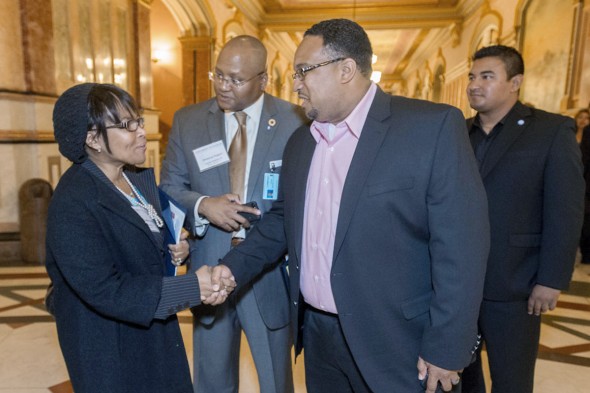Medicaid changes ‘significantly’ affect UI Health, trustee says

Chancellor Paula Allen-Meares was among those who met with state legislators May 14 at the U of I lobby day in Springfield. Photo: Darrell Hoemann
UI Health officials are searching for ways to offset an expected funding shortfall that is the result of a nearly 25 percent reduction in the state’s Medicaid reimbursement rate.
The subject was a topic at the May 14 meeting of the U of I Board of Trustees in Springfield.
Timothy Koritz, chair of the board’s University Healthcare System committee, said the rate change already has led to more than a $3 million revenue loss since it took effect last July.
He said the loss could reach $40 million if the rate is extended by the Illinois Department of Children and Family Services into 2015 as expected.
“This significantly affects us because we have a high percentage of Medicaid eligible patients,” he said.
Koritz said leaders are considering ways to offset the loss, including addressing labor costs. “It’s going to cause a significant problem,” said Walter Knorr, the university’s chief financial officer, explaining that the UI Hospital is the only state medical facility affected by the rate change because of its tax-supported status.
Board chairman Christopher Kennedy said the rate change is, in effect, a vehicle for the state to move expenses off its own books.
“Shifting a $40 million problem from one agency to another — that’s the reality,” he said.
Kennedy said he and other board members would include the issue in conversations with legislators later that day at the annual U of I lobbying day at the state Capitol, an event sponsored annually by the university’s Alumni Association.
Koritz praised hospital leaders for statistics that showed programs targeting the infection rate at the hospital had led to a 50 decrease. He said several medical facility renovation projects were proceeding on schedule.
The board meeting was limited in scope as trustees met with legislative leaders throughout the day. The university’s lobbying efforts included a push to hold state funding equal to the current fiscal year — $663.5 million provided by the state in general revenue funds.
In his fiscal 2015 budget blueprint, Gov. Pat Quinn recommended flat funding for the state’s public universities, based on his proposal to make permanent the temporary increase in the state’s income tax that is set to expire at the end of the year. Without that revenue, Quinn says deep cuts in state spending would be required, including a 12.5 percent reduction for the U of I.
Officials say a reduction of that scale would reduce funding by $82.7 million and would be felt in every phase of the university’s operation — student tuition, class sizes, academic and research programs, workforce and contributions to economic growth.
The university also is seeking relief from state procurement regulations that create delays and impose additional costs in purchasing goods and services, particularly involving research grants. Officials say reforms would improve efficiency while preserving ethics and fairness, and ensure that the university remains competitive for federal and private research grants that brought more than $1 billion into the state this year.
“Legislators need to hear firsthand that the decisions they will make have serious, long-term implications on our ability to maintain our world-class excellence, and our capacity to produce the workforce and innovation that are crucial to the future of our state and nation,” Kennedy said.
Other business
• The board awarded a contract to Atlanta-based Parker Executive Search to assist with the search for a successor for President Bob Easter, who will retire when his term ends June 30, 2015. Parker, a global search firm that specializes in senior-level searches for higher education institutions, will assist a 19-member search committee appointed last month that includes representatives of all major groups on the university’s three campuses. Parker has assisted in several university searches, including one underway to find a successor for Chancellor Paula Allen-Meares when her term ends in January. The search committee will present a list of eight to 10 finalists to the board, which hopes to name a new president by January.
• The board approved a $2.9 million budget increase for Curtis Granderson Stadium. The additional funds will be used for an earthen berm and fencing around the outfield and upgrades to seating and the stadium’s entertainment suite, press box and concession area. The additional costs will be funded through gifts from Granderson and other donors.
